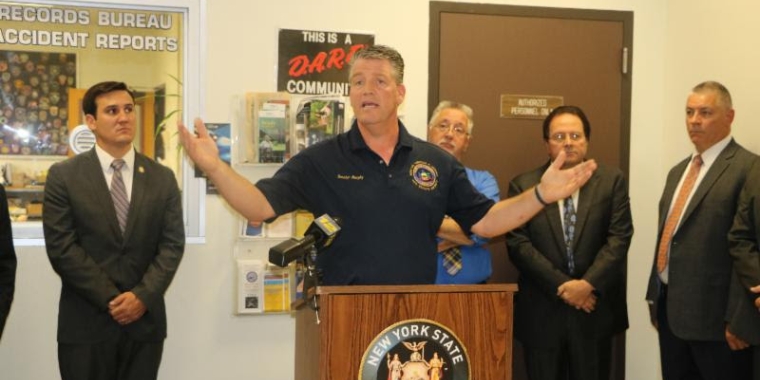
Murphy: Victims, families, need a voice too
June 28, 2016
ALBANY, NY - Too many dangerous criminals have had their sentences shortened or commuted because of legal loopholes. Senator Terrence Murphy has closed one of those loopholes, getting justice for crime victims. A new bill authored by Senator Murphy (S7224), ensures that past and current statements made by crime victims, or their representatives, will be considered when a parole board is making a decision to release an inmate.
"This legislation spares the victim the trauma of having to relive a horrifying experience every time a parole hearing is scheduled," Senator Murphy explained. "Their statement can be read into the record at each parole hearing, ensuring their voice is heard. It also emphasizes that the impact of a potential parolee's actions should not be forgotten. A victim's statements, or their family's, should not have an expiration date."
A crime victim can designate someone to represent them. A representative can be the crime victim's closest surviving relative, a guardian or someone legally appointed to the task. Statements submitted by the victim or their representative may include information concerning threatening or intimidating conduct made by the inmate toward the victim or their family. Crime victims or their representatives now also have the option to request a transcript of the parole hearing.
The legislation was inspired by the release of Terry Losicco, who was convicted in the 1980 murder of 67-year old Somers resident Eleanor Prouty. He also severely beat Eleanor's wheelchair-bound husband, Norman. Losicco was 16 at the time and lived at Lincoln Hall, a school for troubled boys.
Losicco and an accomplice broke into the Prouty's home. Losicco bludgeoned Norman Prouty into unconsciousness with a piece of firewood. He beat and strangled Mrs. Prouty, then stomped on her so hard he left an imprint of his boot on her face. Locisso completed his odious act by sodomizing Mrs. Prouty. Losicco, who was led to believe there were large sums of money in the house, left with $25.
Losicco was convicted of three second-degree murder accounts, two counts of first-degree robbery, there counts of first-degree burglary, one count of second-degree assault and one count of third-degree larceny. He was sentenced to 25 years to life in prison and first became eligible for parole in 2005.
Brooks Prouty was 15-years old when his grandmother was murdered. Since her death, Brooks has fought vigorously to keep Terry Locisso behind bars, including starting an online petition that garnered more than 1,170 signatures.
"You relive the horrible memories every time you go through a hearing," Prouty said. "There's been too much concern in the past for the rights of criminals, too much talk about rehabilitating unredeemable monsters instead of addressing the pain they cause their victims and their families. This is important legislation that holds criminals responsible for their acts. It's legislation with a heart."
Terry Losicco was denied parole seven times over the past ten years before getting approval for his release in March. One of the mitigating factors in Losicco's release was that his parole hearing occurred before the Prouty family was even notified. As a result, no one from Eleanor Prouty's family was available to represent them at Losicco's last parole hearing.
There is a silver lining both in the new legislation and in Terry Losicco's fate. Losicco was arrested June 20th for violating his parole and is being held without bail.
The legislation passed the Senate by a vote of 59-2 and passed the Assembly in May. The bill is expected to be sent to Governor Cuomo shortly for his approval.



